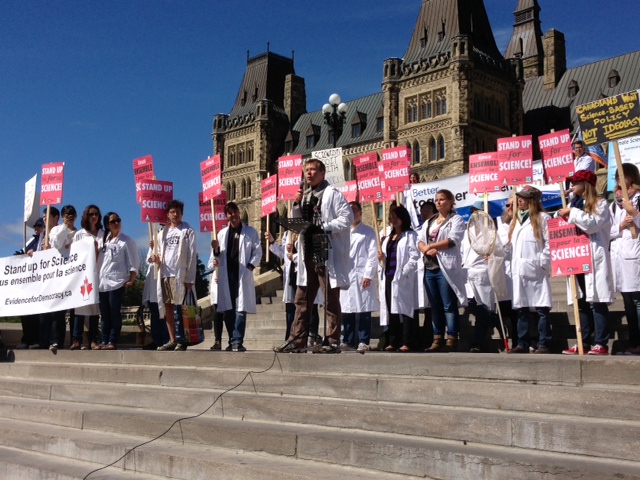Last week thousands of scientists and supporters joined Stand Up For Science rallies in 18 cities across the country, some as far north as Yellowknife.
The rallies were born out of last year’s Death of Evidence protest and continued to decry the muzzling of scientists, gutting of environmental legislation and slashing of environmental research budgets.
The Globe and Mail reported Dr. Katie Gibbs and colleagues “hoped the rallies would alert the public to scientists’ concerns that the federal government has shifted funding markedly toward commercially driven research at the expense of public-interest science.” Dr. Gibbs is a biologist and executive director of Evidence for Democracy, the organization that co-ordinated last week’s rallies.
B.C. MLA Kennedy Steward told the Straight that: “‘Since 2011, there have been 4,000 scientists and researchers who have lost their jobs…Considering we only have about 36,000 researchers in Canada employed by the federal government in Canada, that’s a lot, to lose 10 percent in two years.'”
The Strait reported on David Suzuki’s speech at the Vancouver rally: “‘We now have a prime minister intent on pushing through the pipeline across British Columbia before all of the scientific information — the assessment — is even in,’ said the academic and famed environmentalist. ‘We don’t make informed decisions that way. We have to assess the information available. But what we are now is we are threatened with politicians deciding, not only whether or not to listen to scientists, but the kind of information that scientists are allowed to tell us about.'”
Coinciding with the rallies, the NDP tabled a motion calling for “scientists’ right to speak freely to the public, including expressing opinions beyond their scientific research.”
Ottawa speaker Jeremy Kerr, a biology professor at the University of Ottawa garnered cheers and applause from a crowd of 300 on Parliament Hill when he said “The facts do not change just because the Harper government has chosen ignorance over evidence and ideology over honesty.”
The protest signs included messages like “Science speaks truth, Harper tells lies,” “Evidence takes precedence,” and “Good science = good policy.”
Many signs continued to point to the federal government’s intent to shut down Experimental Lakes Area (ELA), a world-renowned research centre that studies the long-term impacts of global threats to freshwater lakes. The ELA consists of 58 small lakes near Kenora where scientists have studied the effects of water pollution, climate change and other threats for over 40 years. Despite the ELA falling within the mandate of the federal government, the Ontario government stepped in and announced that they would fund the $2 million needed to keep the ELA running. The Manitoba government is also contributing $900, 000 over the next six years. The Council of Canadians, Boreal Forest Network and others that called for the Ontario and Manitoba governments to step in welcomed the reprieve. As a last ditch effort, the Council of Canadians and supporters occupied the ELA and issued an action alert to the Ontario government in April.
However, the fight to save the ELA and protect the integrity of scientific research is not over. iPolitics reported: “Despite Ontario’s efforts to keep the Experimental Lakes Area(ELA) open, the money won’t save the massive research site from drastically changing once the federal government hands over management.
The Winnipeg Free Press reported that Winnipeg “rally spokeswoman Diane Orihel, who led the ELA campaign, said federal budget cuts target science in ways most Canadians aren’t aware of.
Orhiel continued “This is a political decision that is not in the interests of Canadians. Science is inherently apolitical and non-partisan. However, because scientists can see the implications of these decisions on the health and well-being of Canadians, we are willing to step out of our labs and be a voice for science today.'”
To learn more about Evidence for Democracy, click here.
To read about the Coalition to Save ELA, click here.
To read more about the Council’s campaign to help save the ELA, click here.



